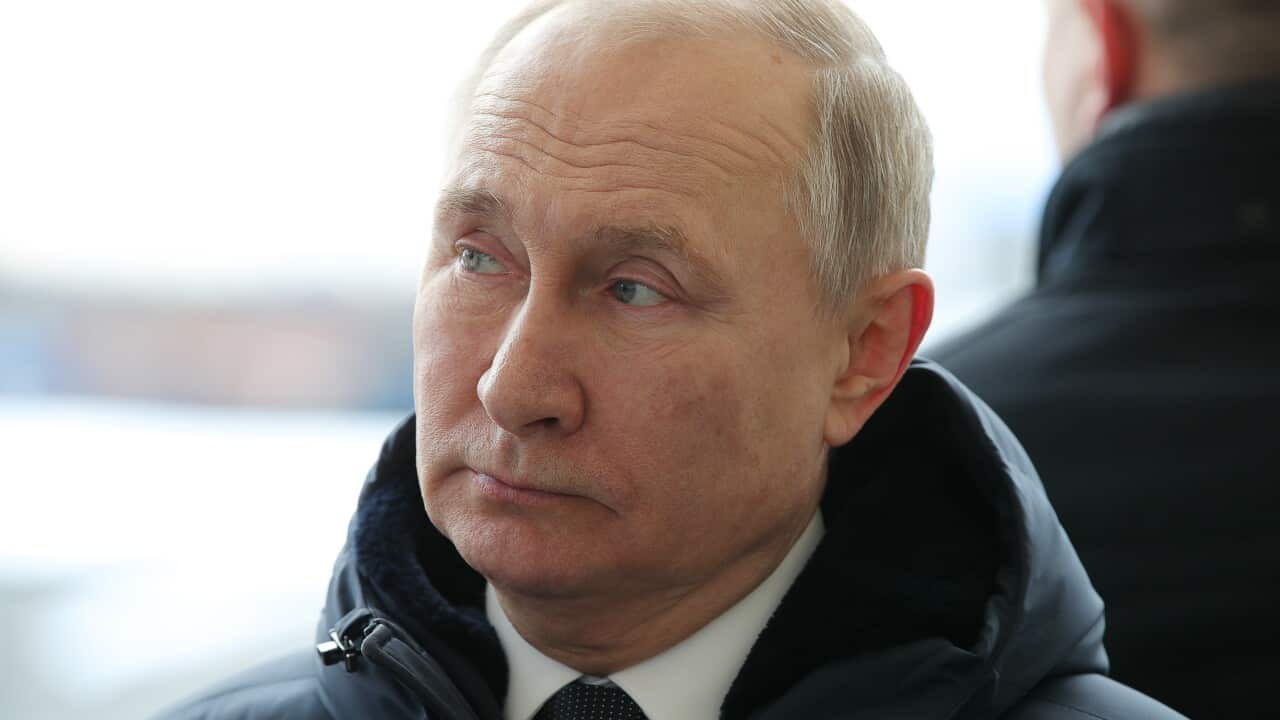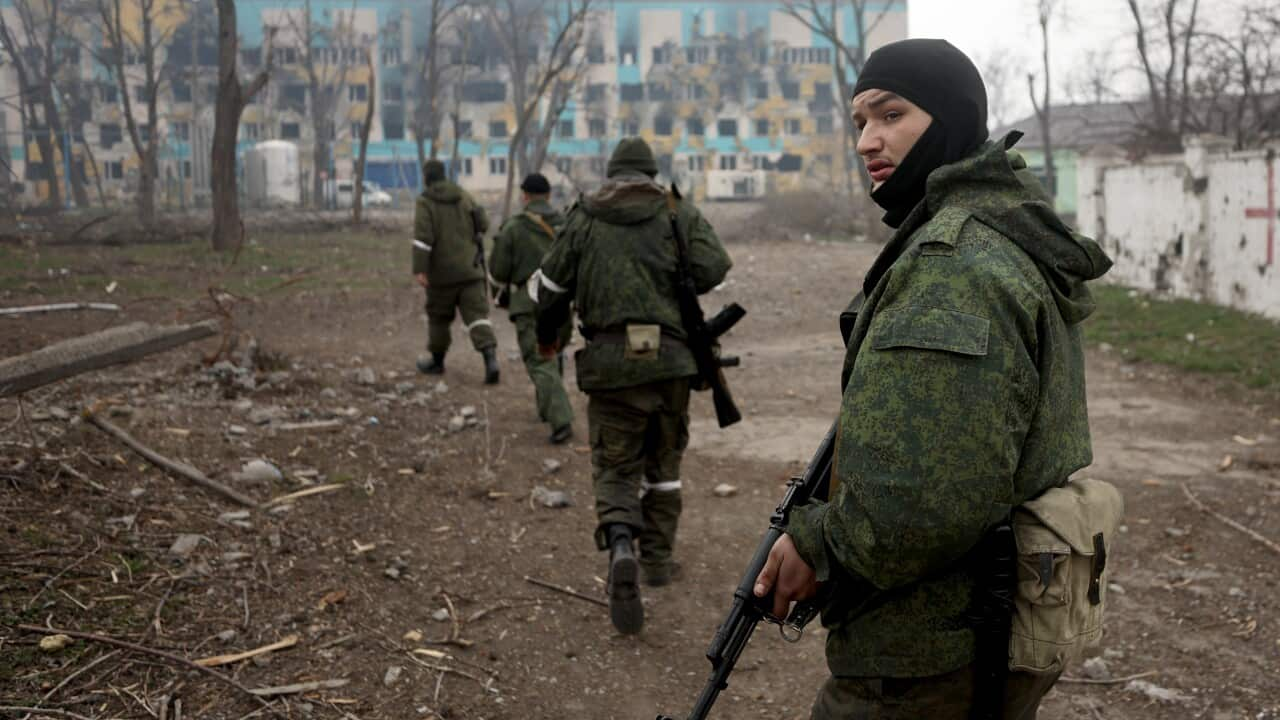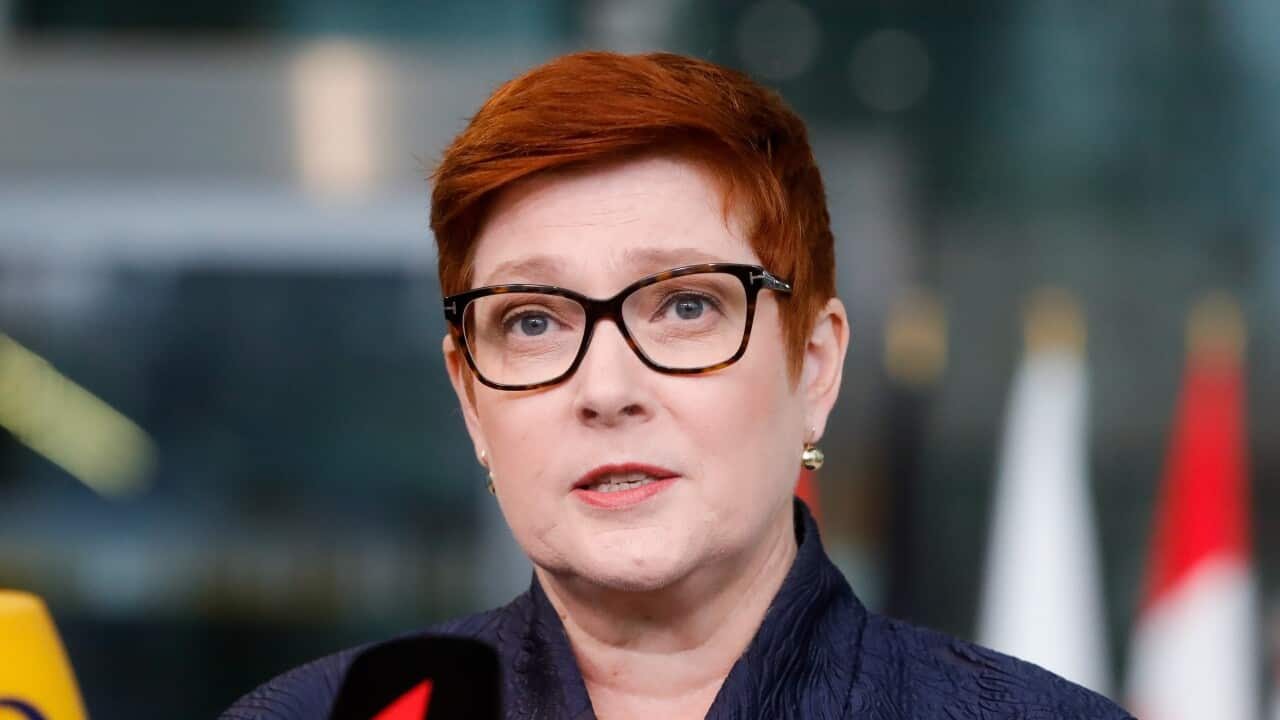Russian President Vladimir Putin, who had largely vanished from public view since his forces were driven from the approaches to Kyiv this month, resurfaced on Tuesday to defend his "noble" invasion of Ukraine, saying peace talks had come to a dead end.
In a press event inside a hangar at a far eastern space base six time zones from Moscow, Mr Putin rattled off talking points: that Moscow had "no choice" but to intervene to protect separatists, defeat neo-Nazis and "help people".
Russia's economy was standing on its feet despite Western sanctions, he added, and signs of war crimes allegedly carried out by Russian troops were fakes staged by the West. As for talks: "We have again returned to a dead-end situation for us."
It was only his second public appearance in a week, following a brief appearance at the funeral of a nationalist lawmaker where he said nothing directly about the war.
Asked by workers at the space base if the operation in Ukraine would achieve its goals, Mr Putin said: "Absolutely. I don't have any doubt at all."
"Its goals are absolutely clear and noble."
But in those remarks, and a later news conference held before flags at the back of the hangar alongside his wartime ally Belarusian President Alexander Lukashenko, Mr Putin frequently seemed to ramble or stammer.
Only occasionally did he adopt the icy, confident demeanour that has been his trademark in public appearances over more than 22 years as Russia's leader.
"That Blitzkrieg which our foes were counting on did not work," Mr Putin said, of financial sanctions.

A tank is seen in a street in the city of Mariupol on 10 April, 2022. Source: AAP / TASS/Sipa USA
On Monday he met the visiting chancellor of Austria. But the meeting was held at a country residence outside Moscow and no images were released, a contrast from talks with Western leaders on the eve of the war, when they were pictured seated at opposite ends of a huge table in the ornate Kremlin palace.
Battle for Mariupol
Russia's tanks pulled out of northern Ukraine after failing in what the West believes was a mission to swiftly capture the capital Kyiv. Many of the towns they left behind were littered with the bodies of civilians killed in what Kyiv says was a campaign of murder, torture and rape.
Moscow denies targeting civilians or carrying out war crimes.
Ukrainian President Volodymyr Mr Zelenskyy published a photo of prominent Ukrainian pro-Russian politician Viktor Medvedchuk in handcuffs after what Mr Zelenskyy described as an operation by security forces.
Kyiv had said Mr Medvedchuk, who faced a treason case, escaped from house arrest days after the invasion began. Medvedchuk, who says Mr Putin is godfather to his daughter, denies wrongdoing.
Russia says its campaign now aims to capture more territory on behalf of separatists in two eastern provinces, a region known as the Donbas. It includes Mariupol port, which has been reduced to a wasteland under Russian siege.
Ukraine says tens of thousands of civilians have been trapped inside that city with no way to bring in food or water, and accuses Russia of blocking aid convoys.
The battle for Mariupol appeared on Tuesday to be reaching a decisive phase, with Ukrainian marines holed up in the Azovstal industrial district. Reuters journalists accompanying Russian-backed separatists saw flames billowing from the Azovstal district.
Since Mr Putin sent troops over the border on 24 February, about a quarter of Ukraine's 44 million population have been forced from their homes and thousands have been killed or injured.
Concern over possible use of chemical weapons
Civilians were fleeing from areas of eastern Ukraine on Tuesday ahead of an anticipated Russian offensive, while Kyiv said it was checking reports that Russian forces had used chemical weapons in the besieged port city of Mariupol.
The battle for Mariupol was reaching a decisive phase, with Ukrainian marines holed up in the Azovstal industrial district.
Should the Russians seize Azovstal, they would be in full control of Mariupol, the lynchpin between Russian-held areas to the west and east. The city has already been laid waste by weeks of Russian bombardments that have killed possibly thousands of civilians.
Deputy Defence Minister Hanna Malyar said the government was checking unverified information that Russia may have used chemical weapons while besieging Mariupol.
"There is a theory that these could be phosphorous munitions," Ms Malyar said in televised comments.
President Volodymyr Zelenskyy had said on Monday night that Russia could resort to chemical weapons as it amassed troops in the eastern Donbas region for a new assault on Mariupol. He did not say if they actually had been used.
. If Russia had used chemical weapons, "all options were on the table" in response, British Junior Defence Minister James Heappey said in London.
Chemical weapons production, use and stockpiling is banned under the 1997 Chemical Weapons Convention (CWC). Although condemned by human rights groups, white phosphorous is not banned under the CWC.

Officials exhume the bodies of civilians, who died during the Russian attacks, from mass graves in Bucha, Ukraine on 11 April, 2022. Source: Getty / Anadolu Agency
But should it prove to be the case, it would mark a dangerous new development in a war that has already left a trail of death of destruction since Mr Putin sent his troops over the border.
About a quarter of Ukraine's 44 million population have been forced from their homes, cities turned into rubble, and thousands of people have been killed or injured — many of them civilians.
Redoubling efforts
Mr Putin calls the action a "special military operation" to demilitarise and "denazify" Ukraine but it has drawn condemnation and alarm in the West, which has imposed a wide range of sanctions to squeeze the Russian economy.
After their troops got bogged down in the face of Ukrainian resistance, the Russians abandoned their bid to capture the capital Kyiv for now. But they are and Ukrainian forces are digging in to face a new offensive.
The governor of Luhansk region, Serhiy Gaidai, urged residents to evacuate using five humanitarian corridors agreed for the east.
"It's far more scary to remain and burn in your sleep from a Russian shell," he wrote on social media. "Evacuate, with every day the situation is getting worse. Take your essential items and head to the pickup point."
In all, nine humanitarian corridors had been agreed for Tuesday, including one for private cars from Mariupol, Deputy Prime Minister Iryna Vereshchuk said.
In its morning briefing on the conflict, the General Staff of Ukraine’s Armed Forces said that aside from trying to take control of Mariupol, Russian forces were also intent on capturing Popasna, a town about two hours drive west of Luhansk, and were set to launch an offensive in the direction of Kurakhove, in the Donetsk region.
The Ukrainian military said its troops had repulsed attacks in both Luhansk and Donetsk.
Mr Zelenskyy pleaded overnight for more weapons from the West to help it end the siege of Mariupol and fend off the expected Russian offensive in the east.
"Unfortunately we are not getting as much as we need to end this war faster... in particular, to lift the blockade of Mariupol," he said.

Destroyed residential buildings and mounts of debris are seen as a result of shelling by Russian troops in the village of Borodyanka, in the Kyiv region. Source: ABACA / Voitenko Anna/Ukrinform/ABACA/PA
War crimes allegations
The departure of Russian forces from the outskirts of Kyiv brought to light allegations of war crimes including executions and rape of civilians. Moscow dismisses the allegations as Ukrainian and Western provocations and has also accused Ukrainian forces of sexual violence.
Senior United Nations official Sima Bahous told the UN Security Council on Monday that while all allegations must by independently investigated, "the brutality displayed against Ukrainian civilians has raised all red flags".
"We are increasingly hearing of rape and sexual violence," she said.
Kateryna Cherepakha, president of rights group La Strada-Ukraine, told the council via video: " of war by Russian invaders in Ukraine."
Russia's deputy UN ambassador denied the allegations and accused Ukraine and allies of "a clear intention to present Russian soldiers as sadists and rapists".
Russia's defence ministry said Ukraine's government was being directed by the United States to sow false evidence of Russian violence against civilians despite what it cast as Moscow's "unprecedented measures to save civilians".













